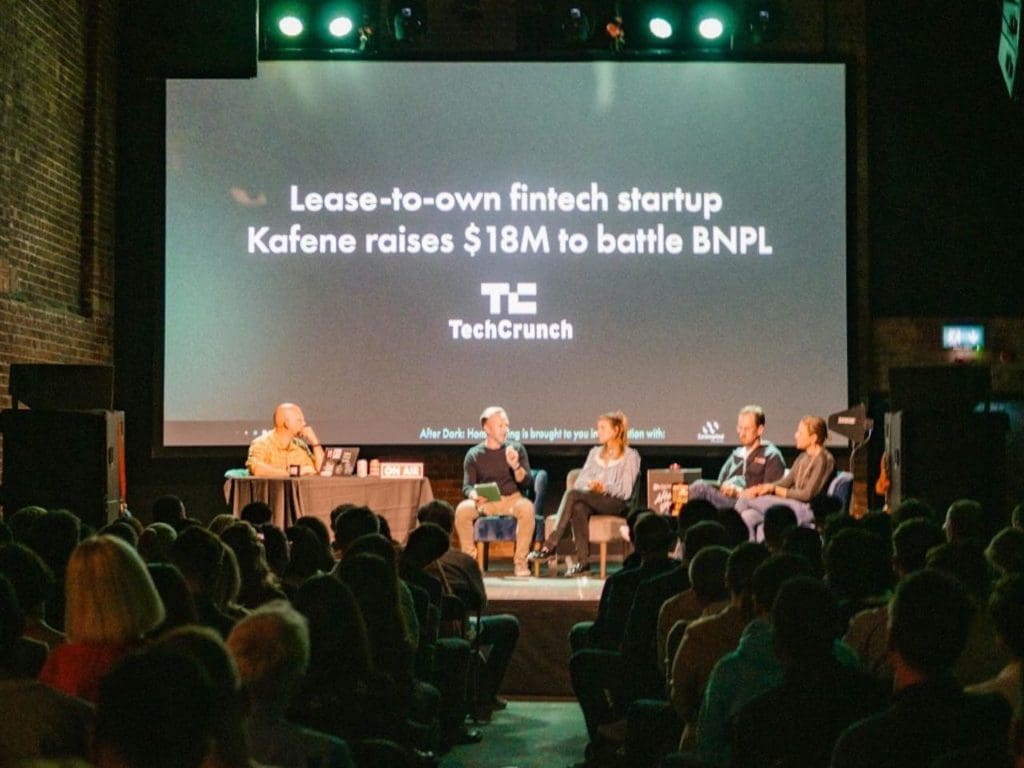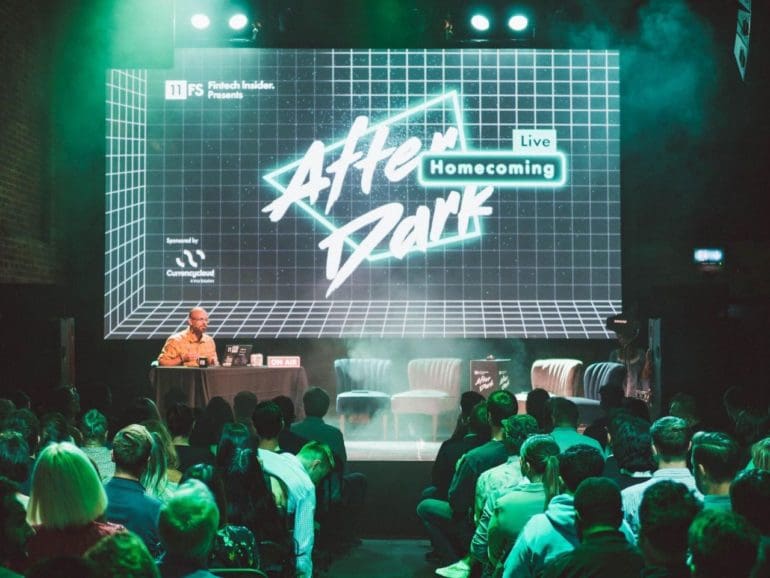Responsibility became the theme of 11:FS’s After Dark live podcast recording in London last week.
Deep in the depths of East London’s Village Underground, a crowd of fintech enthusiasts gathered to eat, drink and be merry while spectating the podcast’s 666th recording.
Kicking off with a BNPL alternative
The conversation started with the news that the fintech company, Kafene, had raised $18 million for a product that could rival BNPL.
Kafene’s lease-to-own product allows customers to rent the product from the fintech until they have paid enough to own it outright. Like BNPL, it aims to make items more affordable, allowing for purchases up to $2,500 for eligible applicants.
The controversial BNPL sector has long been the target of debate. Many believe products to be dangerous, allowing customers to enter into long-term, unaffordable debt. Studies have shown a high number of BNPL customers missing payments, with two in five borrowing funds to pay off what was owed.
The response from others is, “what if there is no other safe alternative?”

Kafene’s solution offers repayment through rental for up to 12 months. Aimed at customers that may not qualify for credit cards or products, the CEO of the company, Neal Desai, told Techcrunch, “BNPL is often used for more “nice-to-have” purchases, while lease-to-own is primarily for “must have” buys, like refrigerators or tires, for example.”
“The problem I have with models like this…is that if you don’t have much money, if you cannot afford a credit card, and you use a model like this, you will end up paying 2,3,4 times the value of that product, by the time you own it,” said Sarah Kocianski, Independent Fintech Strategy Consultant.
“This is not my preferred model when you’re looking at new ways to help the underserved, particularly at the moment, for things they need.”
Serving needs while still feeding the cycle of debt
The argument for providing accessibility to “needed” or large items has been used in the past by BNPL. Despite installment payments being part of the financial system since the 19th century, the modern BNPL model has evolved to include buying options for groceries and fashion.
“The problem is, all of these BNPL or hire to purchase products, use that argument, that one use case to say, this is why it’s good. Then, in the end, people aren’t buying a fridge or a new boiler. They’re getting a 60-inch plasma TV and things that are just purchases they don’t actually need,” said Jason Bates, co-founder of 11:FS Deputy CEO.
“But if you do need a fridge, or your boiler blows up, and your credit score is in the gutter, then what do you do?”
“So, along one side of the argument, you’ve got to say, having a facility which does provide some security, which tries to deal with the credit risk to make those use cases work, then you’ve got to have something there. It is going to be more expensive because more people are going to default on it.”

A critical time for a financing alternative
As the cost of living crisis remains critical and many predict it will worsen, these concerns become an ever-present reality. Already levels of people living in poverty and destitution rose over the summer, and household debt to high-cost lenders, including loan sharks, had reached £3.5 billion.
Tightening rules on universal credit and other measures announced in the Chancellor’s mini-budget last week have raised concerns that inequality will continue to thrive, worsening conditions for low earners.
However, a significant difference between the BNPL and Kafene models is the facility to return items if the customer can no longer make the payments. This flexibility could allow the product to be a viable financing alternative for families in economic difficulties, unlike previous models such as BNPL.
“That is not something you can do under the traditional higher purchase agreement. Under that, you’re tied into 12 months, 18 months, two years,” said Kocianski. “If you cannot make the payments, you are thrown into a traditional debt and debt collection cycle.”
Pure intentions with profitable byproducts
Regarding the discussion about BNPL and alternative financing for financial inclusion, Anna Irrera, Senior Editor, Crypto, Bloomberg News, mused, “I always wonder when financial inclusion gets brought up in fintech; how often is it actually financial inclusion? Or is it just something that has been done in finance for a long time and was maybe called exploitative, but you put a little bit of tech, and so we can say it’s financial inclusion?”

In many instances, fintechs and financial solutions are founded to solve existing issues. BNPL is no exception. Touted as a low-cost alternative to credit cards, many reports have found that consumers consider it a friendly, accessible option. In recent months the products have come under fire for creating a circle of debt, but initial reports in 2021 were glowing, and many continue to support the sector.
“It’s quite a tough debate because so much of this does involve lenders that have this business model,” said Richard Davies, CEO Allica Bank. “You may get into it with the right intentions, and then you end up finding the profitable customers that get into a debt spiral.”
“They’re constantly re-borrowing from you and getting increasingly into debt. And it’s just a sad fact that that’s where it often leads.”
Fintech’s responsibility to the customer – where does it end?
The topic of financial accessibility and inclusion set the tone for the following discussion, where the responsibility of fintechs and financial services was considered.
Through the emergence of open banking and even within the traditional finance sector, institutions have access to millions of data points. One of the panelists commented that experts in data had said that it was possible to predict a person defaulting on loans just from seeing changes in their spending history.
“How far does responsibility reach if a bank can tell in advance when people are likely to start to be in trouble?” said Davies. “When you’ve got 20 million customers, you can probably see some interesting signals. Is it their responsibility then to start helping prevent people from going into arrears? Which actually then might make more charges for the bank? Or not? How do we hold the responsibility?”
The thorny subject highlighted a duality in providing holistic services in the finance sector. Skirting the thin line of helping the customer while protecting their privacy seemed fraught with moral dilemmas. Fears (perhaps unfounded) of creating a surveillance state line daily coverage of fintech development products such as CBDCs. Financial services are also regularly damned for not being sufficiently involved with their customers’ well-being.
CEO and Co-founder of Fintech Nexus, Bo Brustkern’s takeaway was this: “Financial Services should engage consumers in high-integrity challenges to their behaviors.”
“If someone suddenly changes behaviors in a way that indicates a likely financial tragedy, something should be said. It’s what a friend does, what an advisor does. It’s absolutely what a financial SERVICES firm should do.”


